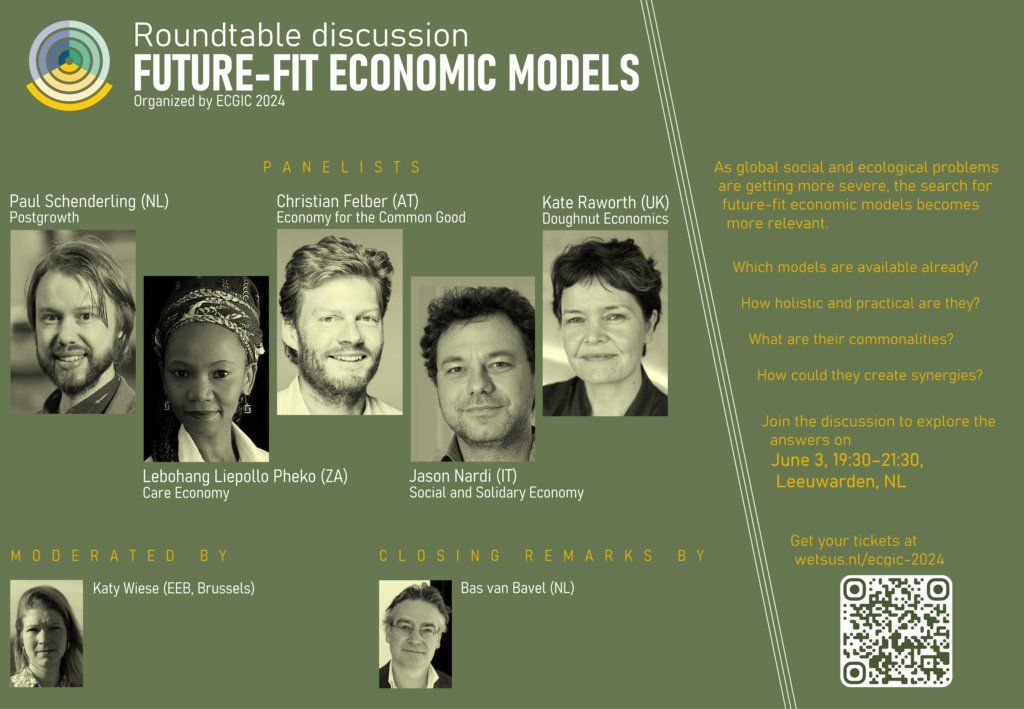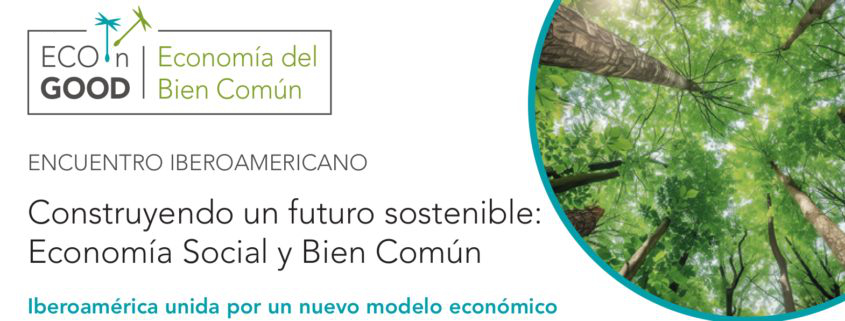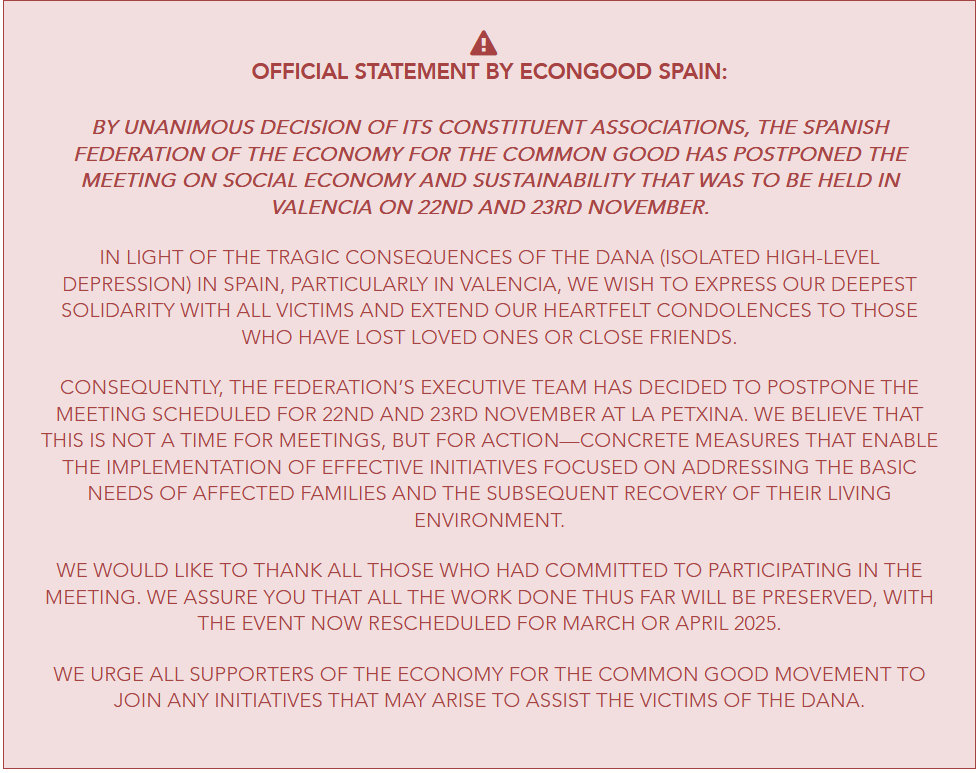|
|
|
|
|
ECOnGOOD Science & Research Hub Newsletter - 4 / 2024
|
Dear ECOnGOOD Science & Research Community,
|
Welcome to our last ECOnGOOD Science & Research newsletter of 2024!
|
We start this time with an enthusiastic reminder: the Call for Hosting for our IV Economy for the Common Good International Conference 2026 is out. We know there are interested institutions out there, don't hesitate and take the step forward!
|
Additionally, we share the publications of, (1) the recording of the ECGIC24 round table on future-fit economic models, and (2) the proceedings of that conference on the UOC's online library. Also, read about two compelling studies; one published recently, about diverse post-growth narratives; and the second, an ongoing work that proposes a new understanding of global trade through an ECG lens.
|
As always, please get in touch with us at science@econgood.org if you have any news/info you'd like us to share in upcoming newsletters.
|
|
Fabricio Bonilla and José Carlos Ramos (Coordinators Science & Research Hub)
|
As always, if you have any news for this newsletter, please send a note to science@econgood.org. Thank you!
|
|
|
|
|
|
|
Join our LinkedIn community!
We're excited to have you join our recently created but vibrant Science and Research LinkedIn community of academics, students, professors, researchers, scientists and professionals passionate about alternative and just economic models.
|
We believe in collaboration over competition, so here's what you can do to get involved:
|
|
>> Participate: Engage in discussions, share your findings, and contribute your insights. Your unique perspective is valuable to our collective knowledge.
|
>> Invite: Spread the word! Invite others who might be interested and have ideas of their own to share. Let's grow our community and amplify our impact.
|
>> Review the rules: Get familiar with some basic norms to ensure a respectful and inclusive environment. Find them in the group description and the #ECOnGOOD Code of Conduct.
|
|
Let's work together to transform our #economy for the common good. Join us in shaping a better future!
|
|
|
|
|
ECONOMY FOR THE COMMON GOOD INTERNATIONAL CONFERENCE (ECGIC)
|

|
|
|
Reminder - Call for hosting for our IV ECG International Conference 2026
We’re excited to invite all interested institutions to send their statement of interest to host our IV ECG International Conference. Planned for Spring 2026. With many lessons learned and enriching experiences from the first three editions, this is the start of what we expect will be a successful endeavor.
|
The IV ECGIC will aim to foster dialogue between the ECOnGOOD organisation, the Economy for the Common Good model (ECG) and other real economic theories. The conference should continue and further develop the interdisciplinary approach of the first three events. More generally, it should respond to the conferences’ overall aim of providing knowledge-based foundations to the ECG economic model.
|
|
We open the call to all interested academic/research institutions globally, independently of their experience and involvement in the ECG movement. We strongly encourage applications from global-south institutions/organisations. Please send your declaration of interest by January 31st, 2025 to science@econgood.org.
|
|
|
|
|
|
|

|
Publications related to the ECGIC24
Video of the ECGIC24 Round Table - Convergence of future-fit economic models
|
We recently published the recording of the historical round table we had at our 2024 ECG International Conference. It gathered five representatives of future-fit economic models: Christian Felber (ECG initiator), Jason Nardi (Social and Solidarity Economy), Kate Raworth (Doughnut Economics), Lebohang Liepollo Pheko (Wellbeing, Decolonial and Feminist Economics), and Paul Schenderling (Postgrowth) engaged in a constructive session on the convergence of these much needed innovative proposals. Deftly moderated by Katy Wiese, Policy Manager for Economic Transition and Gender Equality with the European Environmental Bureau (EEB). Re-live this great moment here.
|
Proceedings published in the Universitat Oberta de Catalunya online library
|
|
The Universitat Oberta de Catalunya (Open University of Catalonia) recently published the book of proceedings and the book of abstracts of our IV ECGIC in their online library. This content will thus be publicly available, and most importantly, for all students of the university to reference in their works. Visit the online library here.
|
|
|
RESEARCH
|
|
|
|
Publication of study "Impact of economic future visions in the Beyond Growth Debate"
With growing attention for a just sustainable development and planetary boundaries, an international debate has arisen about what kind of fundamental reforms to our current social and economic systems are needed. The ECG movement has participated in the conversations in multiple spaces and through diverse platforms. However, only recently has ECG engaged in the post-growth alternatives debate, ad we consider crucial our participation.
|
In an explorative study, focused in The Netherlands, the independent not-for-profit research organization TNO has examined 11 alternative economic concepts in this ‘Beyond Growth’ debate, to assess their potential meaning for the Netherlands, including Green Growth, Mission Economy, Broad Welfare, Degrowth, Postgrowth and Great Mindshift. The Economy for the Common Good does not appear in the study but we understand that in the pluriverse of heterodox economics, the synergies and collaborative opportunities should guide our contributions.
|
More specifically, the assessment "examined the relationships between the different economic concepts and the views of future societies that they propose. We have analyzed policies and actions needed to realize these world views, and the roles of different stakeholders that they would imply." And strong emphasis was put on policy making.
|
The study finds that the concepts hold distinguishing possibilities for innovative policy making, but they also still show significant gaps in their views of future societies as a whole and pathways towards such societies. While the absence of ECG from the analysis bears its own implications, we here highlight the study's proposed four main routes for further research as highly relevant to our movement:
|
- Further elaborating the described visions of society, the corresponding routes towards social and economic change, and their possible advantages and disadvantages;
- quantifying the potential impacts;
- analysing individual policies and policy experiments already deployed;
- examining public support for possible changes, particularly when it comes to changes in norms and values.
|
You can find the study and the summary here.
|
|
|
|
|
Study Launch "A New Vision for the Global Trade Order"
Last November 21, ECG's initiator Christian Felber co-presented the launch of a working paper that explores an innovative “Economy for the Common Good” (ECG) framework for global trade order —a paradigm designed to address current ecological and social crises through sustainable economic development, human rights, gender justice, and environmental protection. CBS International Business School (Brussels) published the groundbreaking working paper that challenges the traditional “free trade” paradigm and proposes a new ethical approach to global trade.
|
Co-edited by the European Environmental Bureau (EEB), the Wellbeing Economy Alliance (WEAll) and the World Fair Trade Organization (WFTO), Christian Felber also co-authored the study with two other transdisciplinary experts. Brigitta Herrmann, Professor of Globalisation, Development Policies and Ethics at CBS International Business School. And Juergen Knirsch, biologist specializing in ecology, trade and environmental issues, formerly at Greenpeace Germany where he focused on WTO, UNCTAD and EU trade agreements.
|
A central proposal in the paper advocates a new framework for trade embodied in the United
Nations Ethical Trade Zone (UNETZ), to replace the current WTO rules and governance. "Those countries that ratify and comply with UN conventions and agreements would trade freer with one another and could protect their higher commitments and standards both against non-ratifiers and non-compliers."
|
|
|
|
<< Beyond the United Nations Ethical trade Zone (UNETZ) system, a series of new elements for the global governance architecture is proposed: a global merger control, a Global Financial Authority, a Global Tax Authority and a World Court of Human Rights that can be invoked by every person whose rights have been violated by either a state or a company. In return, the system of global tribunals (e.g. ISDS courts) that are operating at the exclusive service of investors and at the expense of governments would cease to exist. >>
|
|
|
You can find the policy brief here and the whole CBS publication series here.
|
|
|
|
|
Invitation to publish and disseminate your work through our newsletter
|
Do you have ECG-related work you would like to disseminate and inform the community about? Or do you know of others who do? We invite you to share it with us. You can send it to our science@econgood.org address, or you can also publish it directly onto our LinkedIn Science & Research community. Be it recent publications, research you are developing, or an opinion article about ECG science/research topics, this is a space for you to leverage those ideas, engage and contribute to the transformation of our socio-economic systems.
|
|
|
|
|
|
|

|
EVENT Postponed - official message
|

|
|
|
|
|
|
New Master Thesis publication from the HAWK in Göttingen (DE)
Last November, Gloria Sindermann published the MA titled "Die Gemeinwohl-Ökonomie im Kontext des Employer Branding: Wie die Zertifizierung die BFGoe und ihre Mitarbeitenden prägt" (The ECG in the Context of Employer Branding: How the Certification Shapes BFGoe and Its Employees) to graduate from Regional Management and Economic Development at the Faculty for Resource Management of the HAWK.
|
The "war for talents" in Germany and other industrialized nations is driven by demographic changes, globalization, and shifting societal values. SMEs face particular challenges in competing for talent. Employer branding, including certifications like the ECG model, aims to attract and retain employees through ethical and sustainable values. While ECG certification shows promise, its impact on employer attractiveness and workplace practices remains underexplored.
|
This thesis examines whether ECG certification supports employee recruitment and retention by studying a certified Göttingen-based subsidiary. Through surveys and interviews, it explores employee awareness of ECG values and their alignment with workplace expectations. The goal is to determine how ECG can address labor market challenges and meet demands for a modern, value-driven workplace.
|
Here we highlight three key results from her study:
|
- ECG certification has the ability to build trust among employees and stakeholders. By demonstrating a tangible commitment to ethical values, it reinforces credibility, boosts morale internally, and enhances external reputation, creating a virtuous cycle of trust and engagement.
- The integration of organizational values with those of employees and stakeholders stands out. This alignment not only cultivates a cohesive culture but also fosters a sense of shared purpose, improving collaboration, satisfaction, and long-term loyalty.
- The development of a forward-looking work environment that emphasizes flexibility, inclusion, and meaningful contribution is the most critical. This enables organizations to attract and retain top talent while staying resilient and adaptive in the face of rapid social, technological, and economic changes.
|
|
|
|
|
|
The ECOnGOOD organisation puts into action the Economy for the Common Good model. This is only possible because of assistance through membership fees, donations and the amazing team of volunteers spread across the globe.
|
You too can get involved and help:
|
This newsletter might link to pages of other content providers for which we are not responsible and cannot be held liable or provide any assistance.
|
|
You have received this ECOnGOOD newsletter because you have signed up for it. Further information on the handling of personal data by ECOnGOOD can be found here (https://www.ecogood.org/imprint/). To unsubscribe, please send an (empty) e-mail to wissenschaft+unsubscribe@list.ecogood.org and reply to the automated message you will get. (Normally it suffices to reply with an empty message.)
|
|
Learn more about our ECOnGOOD Associations
|
|
ECOnGOOD Sciene & Research online
|
|
|
|
|